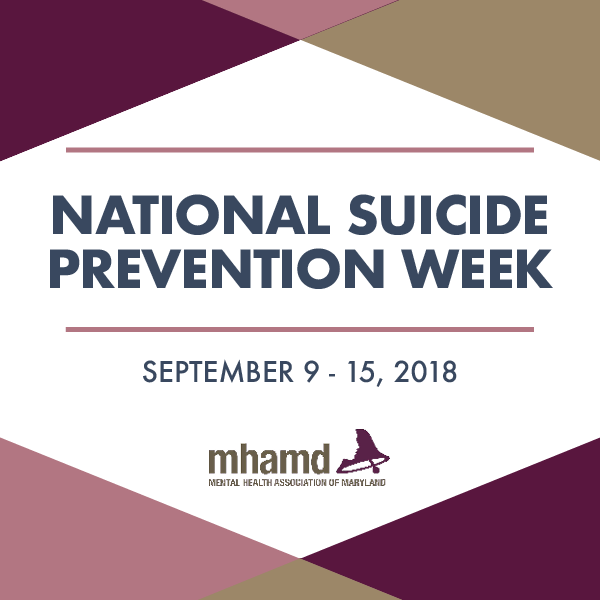Suicide awareness is a major theme in September. We recognize National Suicide Prevention Week all this week. As we focus on this important topic, here are six things to know about suicide, including how you can make a difference.
1. Suicide is a local, national and international problem.
Suicide is the 10th leading cause of death in the United States. Globally, it’s the 15th leading cause of death. In Maryland, the rate of suicide grew by almost 9 percent from 1999-2016, according to the Centers for Disease Control and Prevention. And Maryland isn’t alone. Every state except Nevada saw an increase in suicide rates over this time period.
2. Suicide isn’t unique to any one age group or gender, but there are common risk factors.
Suicide affects everyone, no matter their gender, race, age or how a person “feels.” However, there are often common risk factors: prior suicide attempts, family history of a mental disorder or substance abuse and suicide, family violence (including physical or sexual abuse), firearms in the home and exposure to the suicidal behavior of others, such as family members, peers or media figures.
3. Knowing the warning signs of suicide is important.
We can’t always know when a person is suicidal, but we can be aware of the warning signs. These can include: threats to kill oneself, hopelessness or feeling like there is no way out, withdrawing from friends and family and reckless actions. If you see a loved one displaying these behaviors, it may be time to intervene.
4. Don’t be afraid to ask questions.
If you think a loved one is considering suicide, you may believe the best way to help is to avoid talking about it. In fact, the opposite is true. It’s important to ask them questions that you might not feel comfortable asking, such as, “Are you having thoughts of suicide?” By asking the question, you start a conversation that will hopefully result in your loved one getting help.
5. Where to turn when somebody needs help
If you think somebody needs help, here’s what you can do right away. Call the National Suicide Prevention Lifeline at 800-273-8255 (TALK), connect with its Lifeline Chat or visit its website. If you live in Maryland, you can call 2-1-1 or 800-422-0009 or visit the Crisis Connect page.
6. Connect with these valuable resources.
There is no shortage of resources offering information about suicide awareness as well as ways to make a difference. Here are just a few:
- Visit the Substance Abuse and Mental Health Services Administration (SAMHSA) site for resources on suicide prevention.
- The Children’s Mental Health Matters! campaign offers an information sheet on suicide awareness for families. Go here.
- Download the There Is Hope suicide prevention app.
- Mental Health First Aid gives community members the skills to respond to a mental health emergency. Becoming a Mental Health First Aider can be a life-changing, and potentially life-saving, experience. Find out more.





